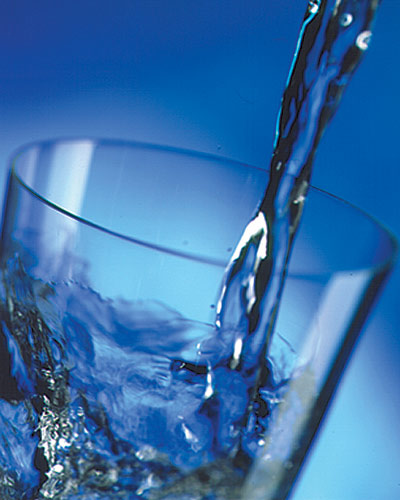DRINK UP The Benefits of Water
Water Content in the Body
- Nearly 60% of the human body is made up of water. Two-thirds of this water is considered “intra-cellular,” meaning within the muscle. One-third of this water is considered “extra-cellular,” meaning that is rests in between the muscle and the skin. Intra-cellular water contains two major minerals: potassium and magnesium. Extra-cellular water contains two major minerals: sodium and chloride.
Note
- In order to exaggerate lean muscle mass, many physique competitors manipulate their mineral intakes in order to enlarge their muscles while simultaneously tightening the fluid layer between their muscles and skin. By decreasing or fully- eliminating sodium-intake and increasing potassium-intake, you can test this trick out. It’s easy! Start by eliminating processed foods (because most of them contain sodium) for 5-7 days. Rely on fresh fruits and vegetables, unprocessed whole grains, fresh lean meats (chicken and turkey breasts), and fresh-cracked egg whites. This is a great strategy for looking your sharpest at special events, photo-shoots and during on-camera work.
The Functions of Water
- In the body, water functions as a solvent and transporter; it dissolves solids. For instance, water dissolves proteins and then transports them to our cells for muscle-building, repair, and recovery.
- Water also acts as a catalyst; water is necessary for chemical and enzyme-based reactions. The vitamins, minerals, and enzymes we ingest from food and supplements only become functional when they are electrically charged ions. These substances cannot become ions until they are dissolved in water.
- Water also acts as a lubricant; it lubricates joints and acts as a shock-absorber for the eyes and spinal column. Water also makes up the majority of the amniotic-fluid, which protects and facilitates fetal development.
- Water regulates our temperature. Heat forces sweat which in turn leads to evaporation. The evaporation acts as a thermal device to cool down the body.
- Water is a mineral source; by nature, it contains fluoride. The processing of tap water through limestone adds calcium and magnesium.
- Water promotes growth; it assists in the synthesis of protein and glycogen trough the process of dissolving and transporting nutrients throughout the body.
Water from Food Sources
- The water content in food differs. Raw fruits and vegetables contain the most water. “Wet” carbohydrates, such as cooked rice and legumes, also contain a considerable amount of water. On the other hand, foods that are higher in fat contain little-to-no water (nuts, seeds, oils, butters).
Recommended Daily Water Intake
- The Recommended Daily Average (RDA) of water intake is 3 Liters (12 cups). A diet high in fresh fruits, vegetables, and “wet” carbohydrates will naturally provide 1 Liter (4 cups) of water/day. Such a diet would drop the RDA down to 2 Liters (8 cups) of water/day. However, factors such as climate, physical activity, sweat and body size will alter daily water needs; warmer climates, increased sweating, physical activity, and body size will all increase water needs….sometimes by as much as 2x!
Dehydration
- Dehydration occurs as a result of too little water relative to sodium. Dehydration can occur from sodium overload, low water intake, or increased rate of sweating. Athletes that practice or compete in warmer temperatures, or those that participate in endurance sports, should consider consuming a low-concentrate, electrolyte-filled drink prior to or during activities in order to assure proper fluid balance (Gatorade or other sports drinks).
Water-loss can create changes in the body. For instance:
% of body water lost & Result:
.5% strain on heart
1-2% declined performance
3% decreased endurance
4% reduced strength and motor skills, overheating
5% heat exhaustion, physical and mental fatigue
6% physical exhaustion, heatstroke, come
10-20% death
Increased Carbohydrates=Increased Water Storage
- There is a direct relationship between increased carbohydrate and increased water storage. For every gram of stored carbohydrate, 3-4 grams of water are stored. This means that rice, beans, potatoes, flours, wheat, and yeasts will cause bloating because they increase the amount of body water storage. If you want to lean out, reduce or eliminate the starch.


I bought a gallon today! Not going to sleep until it is gone!